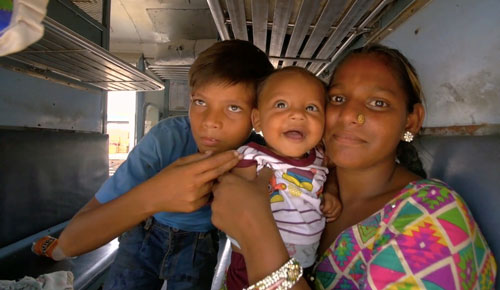
“The most important thing for India is to develop a well crafted universal basic income plan. This will curb interstate migration, improve access to healthcare, curb population growth, and improve the lives of the backbone of the country, the farmers, who now demonstrate every year for loan waivers after they cannot pay back their loans after a disappointing harvest season.” – 安德烈亞斯·範·德·拉爾
安德烈亞斯·範·德·拉爾是 30 來自荷蘭歲的電影製片人. 在五月 2016, 他橫跨喜馬拉雅山前往一個朋友的摩托車後面. 雖然在這個征途上, 他做了與當地人民的連接. 經驗促使他創造了他的第一部紀錄片系列稱為單點七. 由5部分組成的系列探討印度的增長, challenges and innovative solutions in the sectors of Education, 衛生保健, 城市發展與治理, 和農業. 對於系列, Andreas interviewed some of India’s greatest pioneers to find out how this country plans to sustain the largest population the world has ever seen.
全球搜索教育 is pleased to welcome Andreas van de Laar.
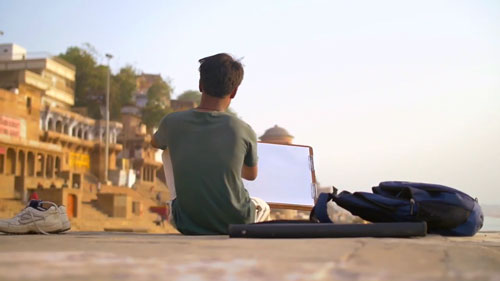
“The innovators in the education episode advocate for giving people relevant education to their surroundings and needs.” – 安德烈亞斯·範·德·拉爾
Andreas what inspired you to make this series?
I was inspired by a speech from the former director of the IMF, explaining that the 21st century will unfold into a completely different paradigm in which Asia by its sheer scale and ambition will have a large impact on the way in which the world will function. 現在, the Asian middle class outnumber those of the rest of the world. Since I believe in a connected world, I wanted to explore how this paradigm shift was evolving and how a country like India would evolve authentically, within the context of the 21st century. I see the world as a classroom and if my batch had 30 學生, 6 of them would be Indian. Wouldn’t you want to get to know them?
You shot most of your five-part documentary on your iPhone. Tell us why, and can you also describe the challenges and benefits of using this method? Would you use this approach again for future movies?
I used my phone as I had to make do with what I had and because I was taught in the philosophy of the Scandinavian film movement ‘Dogme 95’, which featured prominent directors like Lars von Trier, Thomas Winterberg and Susanne Bier, who gave themselves obstructions and rules to abide by while making their films to cut costs, but also to create a more natural and realistic feel to the films they made. 其次, the drive and aspiration of making this film was bigger than my patience of applying for different types of funds. I wanted to make a film about frugal innovation. In order to create the correct narrative of the project, I had to BE my project, which was living frugally, and rely on my improvisation skills. There were a few technical challenges and I also had to improve my editing skills, but the benefits of this approach were great, as I could do the project by myself, didn’t have to hire a crew, and I kept complete creative freedom. I could do everything at my own pace and in my own way without reporting to anyone else. 共, I would definitely make another film in this way and the feedback has been that most viewers don’t see that it is shot on a phone.
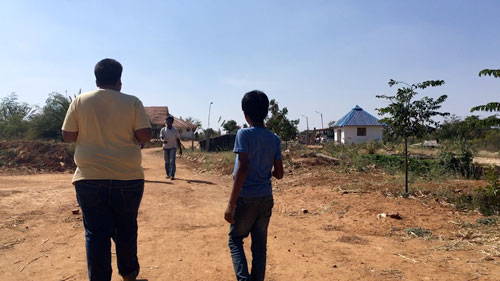
“If you want people to be skilled they have to learn how to learn and learn by doing.” – 安德烈亞斯·範·德·拉爾
You relied on crowdfunding and even hitchhiking to maintain a low budget project? Any lessons learned or stories to share from your experience?
The most important thing standing in the way of achieving my dreams were fear and ego. If you put yourself in a vulnerable position and you have to take favors or accept that you can’t feel entitled, it humbles you and makes you a more content person. I had my laptop stolen in Kasol which contained my fundraising trailer; the whole community helped to eventually get it recovered. I was incredibly grateful and humbled, and after that I never left my laptop out of sight.
What are the main takeaways from India’s restructuring of their education system? Please share your own perspectives on your research as well.
India is primarily an agrarian nation that is trying to become a global superpower with a labor force that is generally unskilled in other professions. Since there will not be enough jobs in the private sector, they have sufficient highly educated people to fill the private sector jobs, with a majority of the working population requiring skills. This part of the population needs to be skilled instead of having to invest their time in rote-learning and theory. The innovators in the education episode advocate for giving people relevant education to their surroundings and needs. If you want people to be skilled they have to learn how to learn, and learn by doing. The education system has to recognize and own up to the reality that not everyone will have a job in an air conditioned office in the big city, so their education should also not be geared towards that. There is also a lot of high school drop-out because many youths have to start working for their families around the age of 14 and don’t go to a school that equips them for jobs within their capabilities. If they gain skills and learn how to learn early on, they can apply these skills earlier in their lives and also grow with the demands of a changing employment landscape in India.
Did you meet any critics that oppose your research for the restructuring of India’s urban planning and educational systems? 如果是這樣的, tell us how you managed those situations.?
The biggest point of critique was that I made an elitist film that didn’t speak to the communities that suffer the most from the current policies. There was no critique in regard to restructuring of the educational system since most Indians are aware of the changes that are required to bring the country forward. They are also aware that this is very difficult with so many villages scattered throughout the vast country of India.
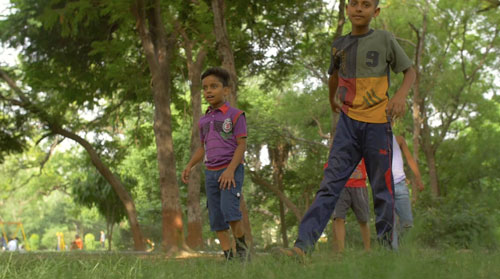
“The education system has to recognize and own up to the reality that not everyone will have a job in an air conditioned office in the big city, so their education should also not be geared towards that.” – 安德烈亞斯·範·德·拉爾
What are the innovations that companies like Amazon and Tata Nano are bringing to India? What are they meant to affect and what was your impression of their strategies?
Amazon had to innovate by decentralizing their distribution model in order to deliver to the far corners of the country. They converted mom and pop stores into storage depots and back offices for their products in order to be able to increase their reach to less connected villages and towns where there is demand. Decentralization done correctly is the only way for India to function. Tata launched the cheapest car ever made in order for families to travel safely instead of on a motorbike and they are leading the way for solar power in India. Solar power cannot be centralized and monopolized in India if the goal is to minimize power cuts and deliver electricity to every one.
Among urban life improvement, healthcare development, and 21st century education reform, what still poses the most barriers to overcome? Would you say these reforms depend on each other if societal progress is to be made?
They are all interconnected, but an overarching factor is required to stabilize them all. The most important thing for India is to develop a well crafted universal basic income plan. This will curb interstate migration, improve access to healthcare, curb population growth, and improve the lives of the backbone of the country, the farmers, who now demonstrate every year for loan waivers after they cannot pay back their loans after a disappointing harvest season. This will give time for cities to breathe, rethink the way they are run and not worry about thousands of people settling every week, requiring new amenities. This will also incentivize farmers and their offspring to continue their craft without being pushed towards working in the cities. I don’t believe in cities that much; they are a result of the industrial revolution and unfortunately that train left a long time ago. Urbanization has to spread out and education has to be promoted by the government, but localized.
Over half of India’s population is under 25 歲. How are younger generations getting involved to ensure a positive livelihood for India’s growing population?
They are not involved enough, since India has the biggest generation gap in history. This comes along with helicopter parenting which keeps the youth from separating and revolting against tradition. Most of them live at home and you cannot sustain a revolution while living with and depending upon the people you are revolting against. 進一步, with politics being very gereatric in India, government positions are occupied by an old boys network, who are not yet vacating their posts. There are voices advocating for more youth to get involved, but it’s more lip service than action. Within the private sectors, many young people are coming up, but working with government remains a slow and tedious process. But the current government is aggressive when it comes to sustainability, and many young startups benefit from governmental incentives. If the government would allow more young voices to participate in it, further progress could be made. India is facing the most important generational transition in its history and it is difficult to say whether the new generation will be in power in time.
下一步是什麼? Has creating “One Point Seven” inspired other stories and future projects?
Next up is a book and possibly a new film. The book will be about my journey and experiences in India in the past year, but the topic of my next film is yet to be decided.

ç. M. Rubin and Andreas van de Laar
感謝您對我們的 800 加上全球貢獻者, 教師, 企業家, 研究人員, 企業領導, students and thought leaders from every domain for sharing your perspectives on the future of learning with 全球搜索教育 每月.
ç. M. 魯賓 (凱茜) 是CMRubinWorld的創始人, 在線 出版公司專注於全球學習和未來 星球課堂的聯合創始人. 她是三本暢銷書和兩個廣泛閱讀網上系列的作者. 魯賓收到 3 厄普頓·辛克萊獎“全球搜索教育”. 倡導青年的系列於 2010 並匯集了來自世界各地的傑出的思想領袖,共同探討所面臨的國家的關鍵教育問題.
按照ç. M. 魯賓在Twitter: www.twitter.com/@cmrubinworld




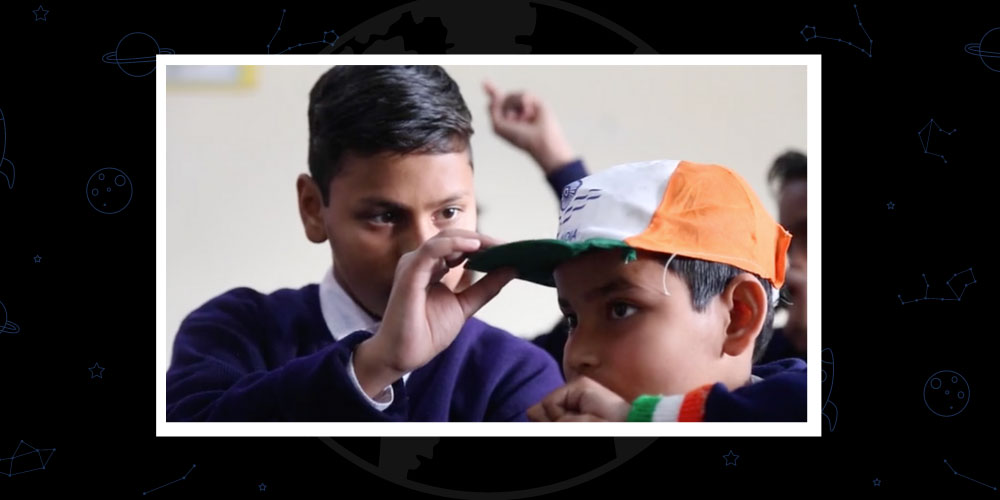
最新評論